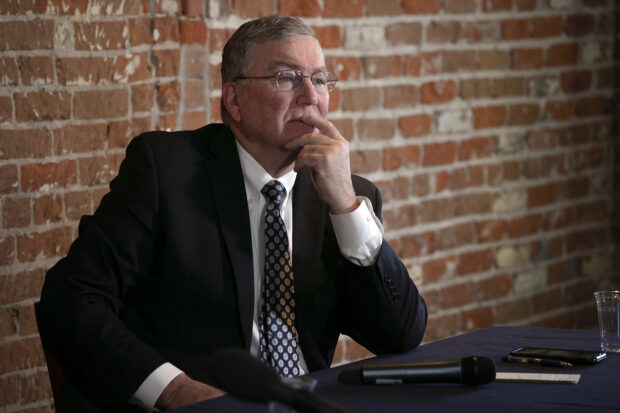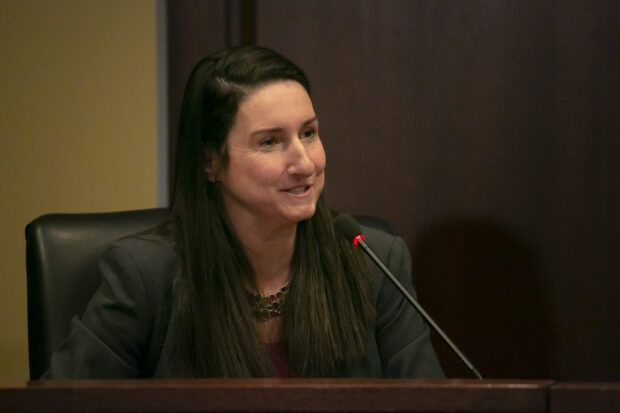After 74 days — and in the presence of a pandemic — the 2020 Idaho Legislature appears to have wrapped up its business Thursday.
At 6:33 p.m. Thursday, the Senate made it official, adjourning for the 2020 session.
The House did not follow suit, and will reconvene Friday morning. That gives the House the procedural option of trying to override Gov. Brad Little, should he veto any House bills on his desk. The House could decide to adjourn for the year Friday, after working through its routine orders of business. “We’ll see where everybody is at that point,” said House Speaker Scott Bedke, R-Oakley.
As the session winds to close, here’s a recap — and a look into a murky future.
What happened (and didn’t happen) on education
When the session began on Jan. 6, Gov. Brad Little laid out an education agenda that built on recommendations from his Our Kids, Idaho’s Future K-12 task force. For the most part, Little got what he wanted:
- A five-year, $223 million plan to boost teacher salaries — with an emphasis on veteran teachers. The first installment will cost about $32 million. On top of that, lawmakers funded the second installment of Little’s two-year plan to raise the minimum teacher salary to $40,000.
- Continued funding for Little’s early literacy initiative. The state will spend $26 million to help at-risk readers in kindergarten through third grade.
- Continued funding for the Opportunity Scholarship, in excess of $20 million.
- A $1 million one-time line item to launch a joint cybersecurity program at Boise State University, the University of Idaho and Idaho State University.
- A $1 million line item to help schools train their staff to help students facing social-emotional issues.
But while Little certainly left his mark on education in 2020, so did House conservatives, particularly on the House Education Committee.
- House Education spent weeks holding hearings on education rules — especially science standards and the Common Core-aligned math and English language arts standards — and pushed the conversation to continue. A legislative committee will spend the off-season studying the standards, with an eye to replacing the Common Core standards.
- House conservatives helped kill a pair of higher education budget bills on the floor, again pushing back against a system they consider bloated and out of step with Idahoans. Ultimately, however, the pushback had only a minimal impact on the bottom line. Lawmakers approved a higher ed budget that slightly exceeded Little’s request.
- One of the most controversial bills of the 2020 session, a transgender athletics ban, originated in House Education, and was pushed by one of the committee’s most outspoken conservatives, Rep. Barbara Ehardt, R-Idaho Falls. Despite Statehouse protests — and questions about its constitutionality — the ban passed both houses, over objections of Democrats and a handful of Republicans. Little now gets the last word.
Several high-profile education issues didn’t make it through the Legislature.
- A bill to revamp the K-12 funding formula never got a hearing. Four years after legislators began discussing a rewrite, the formula remains unchanged.
- A bill to eliminate March and August school bond and levy elections passed the House but stalled in the Senate.
- Ehardt’s opt-in sex education bill never got a House hearing.
- A Senate committee rejected a bill to allow teachers and employees to carry firearms in school.
An invisible shadow over the session
Little launched into his second legislative session with two overarching messages. He said the state must continue to deal with the impacts of rapid growth, but also said the state needed to position itself for an economic downturn.
Eleven weeks later, the threat of recession is much more real, as the coronavirus begins to close and curtail businesses across the state.

In many areas, even in education, the Legislature had approved austere budgets even before the coronavirus struck. Higher education will receive only a 0.3 percent increase from the state’s general fund budget next year — and like most state agencies, the colleges and universities were ordered to cut spending for 2020 and 2021. Little spared K-12 from these budget cuts. All told, K-12 spending will increase by 4.6 percent, compared to a 6.1 percent increase the previous year.
But as the Legislature put the finishing touches on the 2020 budgets, many lawmakers openly fretted about what might await in 2021. They worried about the myriad effects a downturn could have on the state — from cratering sales tax revenues to an increased demand for higher education, as out-of-work Idahoans decide to enroll in college.
One of the biggest accomplishments of the session, said Bedke, was investing in K-12 while replenishing the state’s budget reserves. “We‘ll see how this all turns out,” he said Thursday evening. “It may be very prudent.”
Bedke was reluctant to speculate on how the budget picture might look when the Legislature returns in January. But he pointed to the the approach he and other lawmakers took during the Great Recession — cutting K-12 funding as a last resort. “How we’ll do it this time will look a lot how we did it last time.”

The invisible coronavirus also cast a sobering shadow over the Statehouse in the final days of the session. Legislative leaders opted to continue with the session — holding committee hearings and floor sessions — even as public health officials cautioned against large public gatherings. Democratic leaders openly criticized the decision to stay in session. A handful of lawmakers opted for social distancing, leaving the session in its final days.
“It was frankly embarrassing that the Legislature remained in session until today,” House Minority Leader Ilana Rubel, D-Boise, said during the Democrats’ news conference Thursday afternoon.
Republican leaders have said they sought to finish their business for the year, while taking proper precautions.
“We are not downplaying or underplaying the seriousness of this,” said Bedke.
Read more: A roundup from the final day of legislative business.
